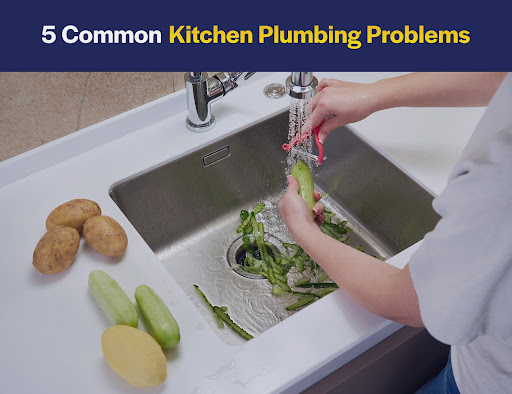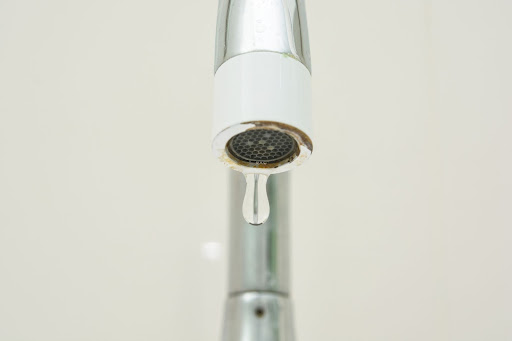
The kitchen is easily one of the most fundamental spaces in our day to day lives. Unfortunately, certain kitchen plumbing problems disrupt our daily activities and become a nuisance to deal with. Let’s go over some of the most common kitchen plumbing problems you might face and how you can go about fixing or preventing them all together.
Clogged Kitchen Sink
The most common kitchen plumbing problem is a clogged kitchen sink. As grease, food particles and waste drain down, they gradually build up, causing a blockage in your pipes. Drain clogs should never go untreated and ignored as they can quickly build up and cause severe damage to your plumbing system. Small clogs may be resolvable with a plunger or drain auger, but for best results consider adding hydro jetting as a regular part of your plumbing maintenance to keep your drains working efficiently.
Damaged Garbage Disposal
To prevent damage to your garbage disposal treat your drains with care. Somethings you should never allow down the the drain include:
- Fruit peels
- Stringy foods such as pasta
- Coffee grounds
- Nuts
- Oils and grease
- Egg shells
- Rise, flour or oatmeal
- Raw meat
- Bones or pits
Always turn your water and disposal on before adding anything down the drain and run cold water for at least 15 seconds after using the disposal. Cold water will keep certain materials in their solid state, ensuring that they get grounded up and completely flushed down the main line.
Leaky Dishwasher
A leaky dishwasher can point to an array of problems. It could mean the door latch is loose and not latching properly causing water to leak through the cracks of the door. To fix this all you need to do is grab a screwdriver and tighten the latch. A leaky dishwasher could also be the result of a faulty or damaged door gasket or a leaky pump seal.
The first step to narrow down this common kitchen plumbing problem, is to establish if water is leaking when the dishwasher is running or when the kitchen sink is on. If you notice water leaking while the dishwasher is on, then your dishwasher needs attention and some parts may need to be replaced. If water is leaking around your dishwasher when the kitchen sink is on, the dishwasher drainpipe is too low. Raising the drain pipe higher than the sink drain will resolve this problem.
Low water pressure
 Another common kitchen plumbing problem is a clogged aerator that causes your water pressure to decrease. The aerator is a small screen that attaches to the end of your faucet and is responsible for adding air into the water coming out of your faucet to control the stream. When this little screen gets clogged with calcium buildup, it decreases the water flow all together.
Another common kitchen plumbing problem is a clogged aerator that causes your water pressure to decrease. The aerator is a small screen that attaches to the end of your faucet and is responsible for adding air into the water coming out of your faucet to control the stream. When this little screen gets clogged with calcium buildup, it decreases the water flow all together.
Fortunately the solution is simple! Aerators easily unscrew from your faucet and can be cleaned with basic household products or vinegar. Grab a small brush and gently clean away any built up inside the faucet, screw the aerator back on and your water should run at regular pressure!
Too little or too much hot water
If your kitchen sink seems to struggle to provide hot water, chances are it’s time to upgrade your water heater. Your water heater may be of too small capacity to supply all your fixtures with hot water or it may simply need replacing because it is malfunctioning from years of wear and tear.
Never turn up your water heater thermostat in an attempt to solve this issue. Your water heater should be set to 120 degrees Fahrenheit to prevent corrosion, scalding and the decreasing of your water heater’s efficiency. If your water heater is in good working condition and the appropriate size, it may be that there is a blockage somewhere down the line between your water heater and faucet. Having your water heater regularly serviced will give you the optimal opportunity to prevent your water heater from failing and ensure it is in good working order.
On the other hand, if your kitchen sink does the opposite and runs burning hot water, a device worth checking is your mixing valve. A mixing valve is responsible for combining both cold and hot water to supply your desired temperature. Mixing valves are installed directly on your water heater but can also be installed at individual fixtures. As with all man made things, mixing valves deteriorate over time and can struggle to sufficiently lower your water’s temperature. It could also mean the valves are not set properly and need a little adjusting.
Though common, these kitchen plumbing problems can prove to be quite an everyday disruption and hurdle to overcome as you go about your days. Call your plumbing professionals at VIP Sewer and Services to say goodbye to your plumbing woes and keep them at bay!


